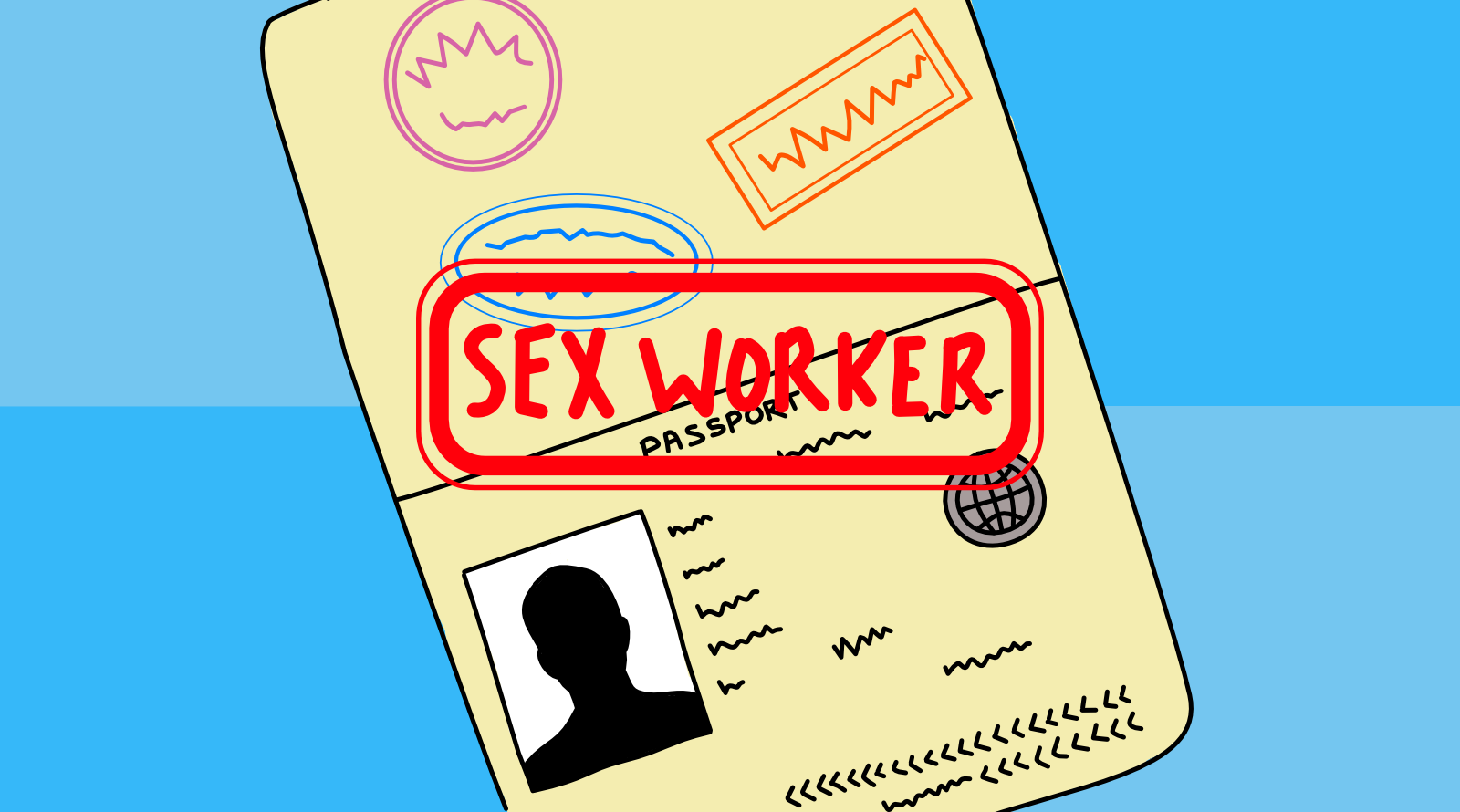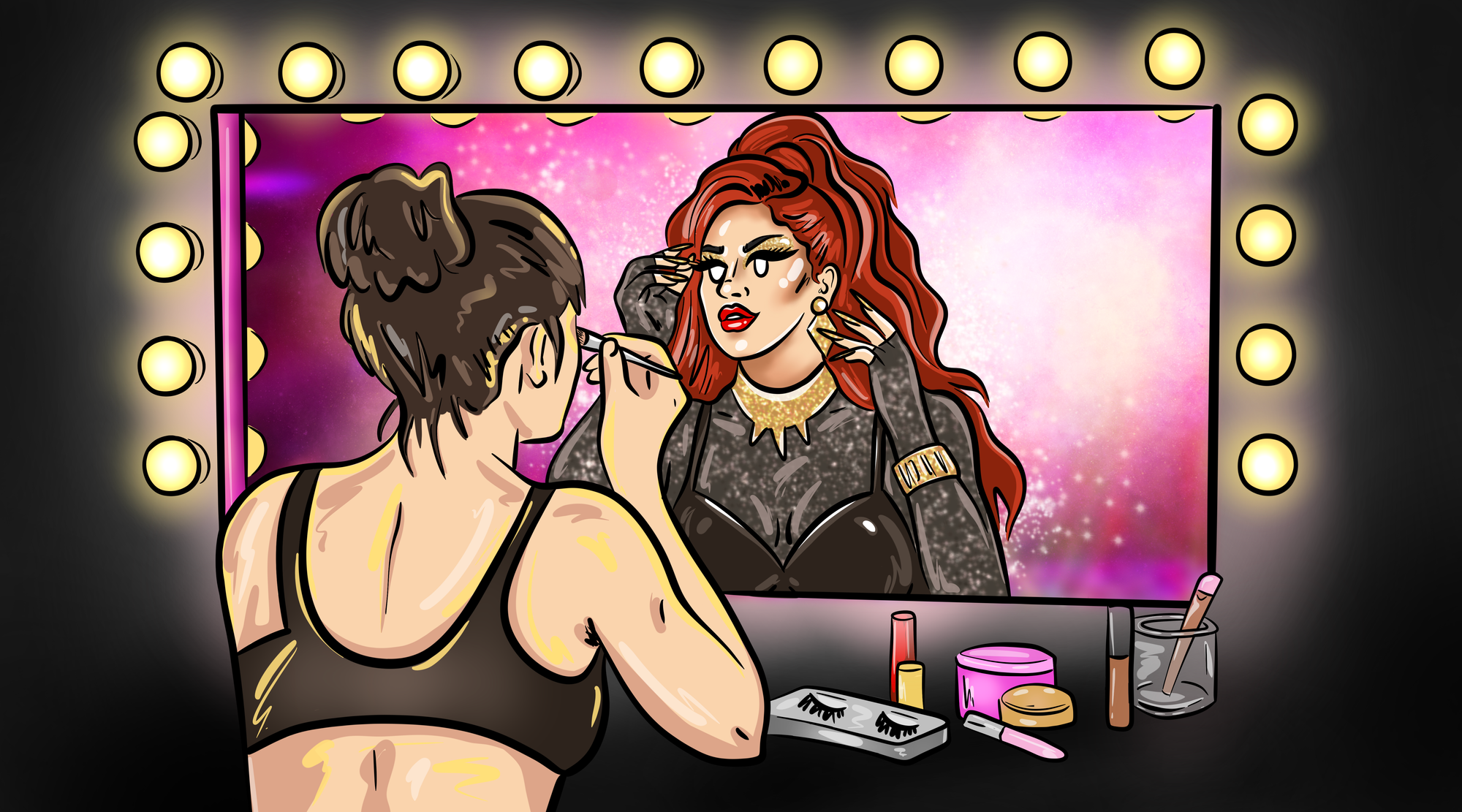In September 2022, I travelled to Atlanta. My plan was to stay there for about a week, visiting my aunt and uncle, then fly to New York for another week and stay with friends.
I arrived at the airport after the 9-hour flight, queued up at passport control, and was called to the booth. They took my fingerprints, scanned my passport, and took my picture. I waited to be allowed through. The officer glanced at me, then spoke into the speaker: “Officer escort to booth nine.” From where I was standing, I could see her computer screen, which read ‘refer to immigration’. Next to my picture it said ‘suspected to be part of a multinational escort ring advertising on RentMen’. There were other comments and alerts that I couldn’t see. At that, I obviously started to panic. An officer led me to a waiting room, which was a locked room with mirrored walls, so the officers at the desk outside could see in but we couldn’t see out. There were about twenty of us in the room, including families with children, and occasionally a guard would appear at the door and summon someone. I waited there for an hour before being interviewed, feeling partly terrified and partly just resigning myself to the situation and trying not to worry too much. Since I had seen the information they held on me, I didn’t deny having done sex work in the past. The officer I spoke to wasn’t unkind, which in my anxious state I appreciated, but with more distance I’m cynical about these ‘friendly faces’ of authority and punishment. She told me that my past escorting made me ineligible for the ESTA visa I had travelled with, and that I would be sent back to the UK.
It’s not clear how I was flagged. It may have been facial recognition (I later overheard two officers talking about how Atlanta was among the first airports in the US to have new facial recognition software), or it may be that RentMen had sold or been forced to hand over personal details about anyone advertising on their site. This crackdown on online advertising platforms is part of the US FOSTA/SESTA bills, ostensibly aimed at increasing online safety and protecting victims of sex trafficking. These draconian laws actually lead to more harm, as sex workers are forced onto the streets instead of advertising and negotiating with clients online, as well as removing spaces for workers to share information about dangerous clients or safer working practises.
It’s not clear how I was flagged.
It may have been facial recognition...
The lack of transparency around the methods used to trap people at the border causes stress and fear, as well as enabling border control to stop anyone with little evidence, for example if they’re travelling with sex toys or they have nude photos on their phone. Although many workers do not show their face online, sharing passport details or other ID documents is unavoidable, as most advertising sites require them for proof of age. This means that travelling to the US is a gamble for anyone who has ever engaged in any kind of sex work, as the rules seem to be applied inconsistently and unpredictably. On a personal level, it’s bizarre and anxiety-inducing that I still don’t know why they stopped me or what information they have about me.
Later, I was taken to a small interview room and asked further questions, including basic personal details, and information about my sex working history. I do porn as well as full service work, but I wasn’t asked about that. The questions were not about whether I intended to work in the US; they asked this once, but my visa was revoked regardless. When I spoke about the experience on social media afterwards, I was criticised for expecting to be allowed to enter without a work visa, but I wasn’t denied entry on this basis. US law states that anyone who has engaged in prostitution “within the last ten years” will be denied entry, even—as in my case—where the activities are legal in the individual’s own country.
Several of the questions asked at this point focused on sex trafficking: Are you being coerced? Do you have any fears about being sent back to your own country? In a way, these questions felt like a method of sidestepping any accusations of cruelty or unfairness towards sex workers, by saying, We’re just doing it to help victims of sex trafficking.
US law states that anyone who has
engaged in prostitution "within the last
ten years" will be denied entry...
The issue is that ‘trafficking’ is used as an umbrella term to encompass a wide range of things. As Molly Smith and Juno Mac write in Revolting Prostitutes (p. 57), “Focusing just on commercial sex, some people use trafficking to mean all prostitution, or all migration into the sex industry. Others mean all migration into the sex industry that involves help from a third party, even if that third party is not seeking financial gain (for instance, a friend or relative). It might cover anyone who incurs debt in the process of crossing borders without papers, or who incurs such a debt and pays that debt off through sex work.”
This deliberately loose definition of sex trafficking, including everything from organised crime to simply arranging travel or a hotel for a sex worker friend, criminalises sex workers and puts us at further risk of harm. The lack of workers’ rights, especially for migrants and other undocumented workers, is at the root of this. Sex workers classified by authorities as victims of sex trafficking and, more broadly, human trafficking, are often simply people escaping danger in their home country. Many end up in dependent and coercive relationships at work, for example with a ‘tied visa’ preventing migrants from changing employers, which means they are at risk of deportation if they speak up about unfair or abusive working environments. It’s easy to see, then, how punitive anti-immigration measures produce “vulnerability and harm” (Smith & Mac p. 69). Workers in these situations are far more likely to go into sex work out of a lack of other options.
Laid out in this way, it’s clear that sex work itself is not to blame, but rather the poor living and working conditions that leave vulnerable people with few other options. Instead of cracking down on (a misguided definition of) sex trafficking, the solution is to remove barriers to better working conditions, to help people out of poverty, to enable them to escape dangerous situations, and to open up more options and opportunities. Criminalising sex workers does none of this — it leaves us with a criminal record, little other support or routes out, children taken from their parents, partners implicated, and our privacy violated. The laws penalising sex workers also trap us: if we receive fines, we need to work to pay them off; if we have a criminal record, we will struggle to find alternative employment. As Ruth Wilson Gilmore writes on prisons, although the principle is the same: “Abolition is not absence, it is presence.” Instead of simply removing something—whether that is the prison system or borders, abolition focuses on introducing new, and strengthening existing, safety nets and support systems for people being persecuted by existing regimes.
The laws penalising sex workers also trap us: if we receive fines, we need to work to pay them off...
I’m sure after I was deported, the authorities at border control could tick a box to say that another case of sex trafficking was avoided, regardless of what answers I gave to their questions. I wonder what support and aid would have been offered, had I said I was being coerced into travelling to the US, that I was being trafficked? Would they have helped me? Would I still have been sent back to the country they implied I was escaping from?
After this interview, I was told that all flights back to the UK had left, so I would be held overnight. It was around 10pm US time, so 3am UK time; I hadn’t slept in 24 hours. They told me I would have a private room to sleep, rather than in the waiting room as I’d thought, and naïvely I pictured a bed with a pillow and duvet and somewhere to charge my phone. Instead, I was put in a cell, with an armchair, an airline blanket, no clock, the lights on constantly, and a toilet in the corner. My phone, earrings, and shoelaces were taken away. In my sleep-deprived state I didn’t think to let my family know I would be uncontactable for 16 hours; they knew I had been stopped and questioned, but I hadn’t updated them since then. I tried to sleep. The next morning, I was given a coffee and a cup of instant noodles, and I spent the day doing light exercises in the cell and reading the few books I’d been allowed to keep, once they flicked through to check nothing was hidden inside. In the evening—around 5pm US time—I was finally led from the cell and put on a flight. Until that moment, I hadn’t been able to relax. I’d been scared throughout, and just wanted to go home. They’d told me I had a plane ticket, but until I was sitting down and in the air, I felt on edge, as if anything might happen to make them change their mind and detain me further.
Although I was technically banned for ten years, since the ESTA rule states that you’re ineligible if you’ve done sex work at all in the past ten years, for me it’s essentially a rolling ban, since I’m still a sex worker and I have no intention of switching careers anytime soon. The border control officer did say I could apply for a visa waiver if I wanted, which would involve going to an embassy in person, but I think the chances of being approved for that are very slim, and the experience was scary enough that I’m discouraged from trying at all.
It’s essentially a rolling ban, since I’m still a sex
worker and I have no intention of switching
careers anytime soon.
Since I’ve been back, I’ve heard about the same thing happening to other sex workers, ex-sex workers, and those who were incorrectly classified as sex workers based on border control’s subjective and prejudiced perceptions of them. Like me, most of them have no clear idea about how or why they were flagged, and have no realistic recourse to challenge the decision.
In the moment, the whole ordeal was pretty traumatic. I was treated like a criminal, which felt dehumanising and unjust. After I got back home, I was just happy to be done with it; although I felt some sadness over the missed trip and cancelled plans, the sense of relief I felt was the overriding feeling at the time. Since then, I’ve noticed more lasting effects, such as a pervading anxiety around authority and surveillance. As a sex worker I’ve always been somewhat aware of the persecution we face, but naïvely I don’t think I really expected to be stopped at the border; I didn’t expect this to happen to me. What happened was a stark wakeup call and a reminder, how difficult it is to escape. That even following the law and trying to do everything correctly does not guarantee safety. Despite the ostensible intentions behind these laws and restrictions, supposedly aimed at protecting victims and keeping people safe, the safety and wellbeing of sex workers ourselves are never considered, and the varied and often abstruse methods of persecution we face as sex workers can infiltrate all aspects of our lives. Clearly, the laws themselves are the problem, and full decriminalisation of sex work is the only solution.
Are you a sex worker with a story, opinion, news, or tips to share? We'd love to hear from you!
We started the tryst.link sex worker blog to help amplify those who aren't handed the mic and bring attention to the issues ya'll care about the most. Got a tale to tell? 👇☂️✨




